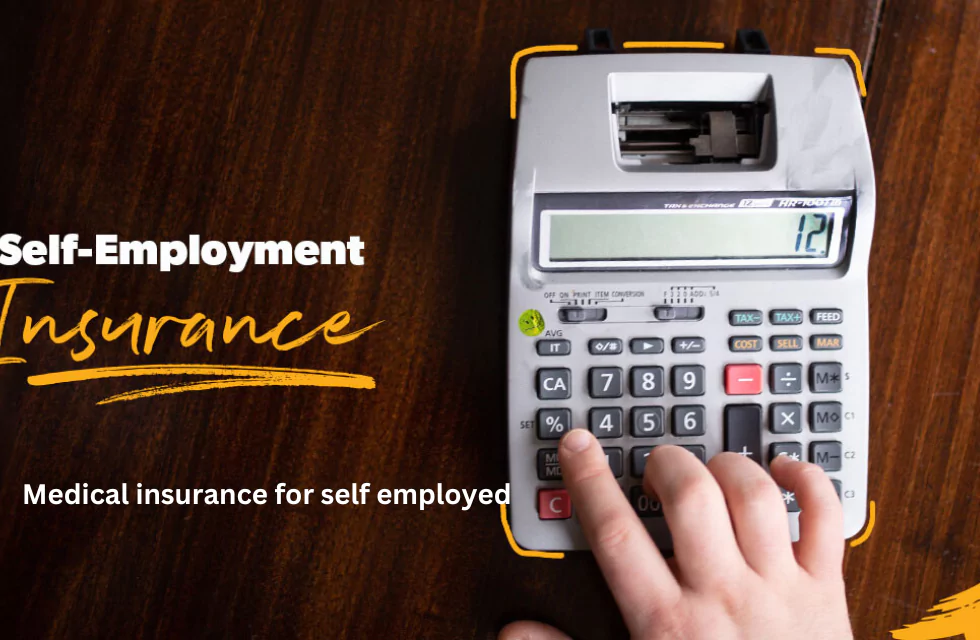Medical insurance for self Self-employment gives individuals freedom and flexibility, but it also comes with certain responsibilities that a typical employee may not face. One of the most important of these is health insurance. For the self-employed, understanding the complexities of health insurance can be a daunting task. Whether you are a freelancer, consultant, or own your own business, understanding your health insurance options is key to maintaining financial stability and peace of mind. This comprehensive article covers the key elements of health insurance for the self-employed and helps you make an informed decision about your health insurance coverage.
How can a self-employed person afford health insurance?
Health insurance can be very expensive, and self-employed people cannot enroll in employer-sponsored insurance. Therefore, it is important to consider all available alternatives. Many self-employed people cover the cost of health insurance through the following methods:
1.Health Insurance Marketplace: A common way to secure insurance is through the federal or state health insurance marketplace. Under the Affordable Care Act (ACA), many people qualify for subsidies based on their income, which can significantly reduce their monthly premiums.
2 .Health Savings Account (HSA): People who are enrolled in a high-deductible health plan (HDHP) can set up an HSA. Contributions are tax-deductible and can be used toward medical expenses, helping to reduce medical costs.
3.Deductions for insurance premiums: If you’re self-employed, you may be able to deduct your health insurance premiums from your taxes. This can lower your taxable income and make health insurance more affordable (more on this below).
4. Join a trade or industry association: Certain professional associations offer group health insurance at discounted rates to their members. Joining such an association can help lower your premiums.
5 .Medicaid or other public programs: You may be eligible for Medicaid or other government-funded initiatives that provide free or low-cost health insurance, depending on your income.
Can I deduct my health insurance premiums if I’m self-employed?
One of the big benefits of being self-employed is the ability to claim a deduction for your health insurance premiums. The IRS allows self-employed individuals to deduct health, dental, and dependent care insurance premiums for themselves, their spouse, and their dependents. This deduction is considered “above the line,” meaning it may reduce your adjusted gross income and lower your total tax liability.
Here are some key points:
. You can claim this deduction if your business made a net profit for the year.
. If you are eligible for insurance through your employer’s plan, you cannot claim the deduction, regardless of your enrollment status.
. The deduction is limited to your company’s net profits. h. It cannot exceed your income from self-employment.
What insurance do I need as an independent consultant?
As an independent consultant, your insurance needs may not be limited to health insurance. Here are some important types of insurance to consider:
1 .Health Insurance: Very important to cover medical expenses related to illness, injury, and preventive care. You can explore your options through the ACA Marketplace, a private insurer, or an association.
2 .Professional liability insurance (errors and omissions): Protects you against claims for negligence or improper performance. Advisors are often at risk of being sued by their clients if their services or advice result in financial loss.
3 . General liability insurance: Covers claims for bodily injury or property damage arising from your business. This is especially important if you meet with clients in person or work in a physical location.
4 . Disability insurance: Insurance that provides income if you are unable to work due to a health problem or injury. Since your income is directly related to your ability to work, disability insurance is essential.
5 .Life insurance: If you have dependents, life insurance ensures they are financially protected if something happens to you.
How do you insure yourself as a freelancer?
Freelancers have a variety of options for enrolling in health insurance.
1 . Marketplace insurance: Like other self-employed people, freelancers can buy insurance on government-run or government-operated marketplaces. Depending on your income, you may be eligible for subsidies that can help ease your monthly costs.
2. Private insurance: If you don’t qualify for financial assistance, you may find better options in the private insurance sector. Some insurance companies offer plans specifically tailored for freelancers and independent contractors.
3. Unions for Freelancers: Organizations such as the Union of Freelancers offer group health insurance at discounted rates. Becoming a member of such an organization can help you get better coverage.
4. Short-term health insurance: If you’re changing jobs or just starting out in freelance work, short-term health insurance can provide temporary protection. However, these plans often have limited benefits and may exclude pre-existing conditions.
Blue Cross Self-Employed Health Insurance: Cost
Blue Cross Blue Shield (BCBS) is one of the best-known companies in health insurance, offering plans in all 50 states. For self-employed people, BCBS offers a variety of options through both the ACA Marketplace and private plans. The cost of a BCBS plan depends on several factors:
- Location: Health insurance premiums vary widely by region. For example, costs in Oregon may differ from costs in California.
2 .Plan type: Costs are also affected by the plan category you choose (HMO, PPO, HDHP, etc.).
3. Income and benefits: If you qualify for financial assistance, your premium burden may be significantly reduced. On average, self-employed monthly premiums through Blue Cross range from $400 to $600, but these rates vary based on aspects such as age, health, and insurance preferences.
Health Insurance for the Self-Employed in Oregon;
Self-employed people in Oregon have several health insurance options.
1.Oregon Health Plan (OHP): Depending on your income, you may qualify for the OHP, Oregon’s Medicaid initiative that offers free or low-cost insurance.
2. Health Insurance Marketplace: Oregon operates a state-run marketplace that offers ACA-compliant plans, and many can receive subsidies that lower their premiums.
3. Private Health Insurance: You can also purchase private insurance through an insurance broker or directly from a company such as Blue Cross Blue Shield.
The typical cost of health insurance for the self-employed in Oregon is about $500 per month, but this cost can be reduced if you qualify for subsidies.
Cheapest Health Insurance for Self-Employed
If you’re looking for cheap health insurance, here are some options:
. Accident Insurance: This low-cost insurance is available to those under 30 or who have a hardship exemption. It has lower premiums, but it mainly covers emergencies and provides minimal protection.
. Medicaid: If you have a low income, you may be eligible for Medicaid, which offers comprehensive coverage at minimal or no cost.
. High Deductible Health Plans (HDHP): These plans have lower premiums but higher deductibles. These are a great option if you’re in good health and don’t expect to have frequent medical expenses.
. Short-term plans: While not comprehensive, temporary health insurance plans offer basic coverage at a discount. Keep in mind that they may not cover pre-existing conditions.
Family Health Insurance for the Self-Employed
If you’re self-employed and need insurance for your family, finding affordable family health insurance is important. Many health insurance companies, including Blue Cross Blue Shield, offer family plans through the ACA Marketplace or private providers. Family plans usually have higher premiums, but they cover the whole family.
How to Minimize Costs:
. Apply for Subsidies: If your family’s income qualifies, you can save significantly on your premiums.
. Consider an HSA-eligible plan: Combining an HDHP with an HSA can help you save on taxes while still covering your family’s medical expenses.
Best Insurance for the Self-Employed .
Choosing the ideal insurance plan depends on several factors, including B. Your health needs, budget, and location. Here are some of the top options for the self-employed:
. Blue Cross Blue Shield: A wide range of plans with a deep network.
. Kaiser Permanente: Known for quality care and an integrated health system.
. UnitedHealthcare: Offers great insurance options and an extensive network.
. Oscar Health: A newer provider offering tech-savvy, easy-to-use plans for freelancers and small business owners.
Bottom line:
Choosing health insurance can be daunting for self-employed people, but with the right information and resources, you can find a plan that meets your needs and financial limitations. Whether you’re looking for economical options, family coverage, or the best comprehensive plan, there are many ways to get quality health insurance and ensure your health as a self-employed person.


